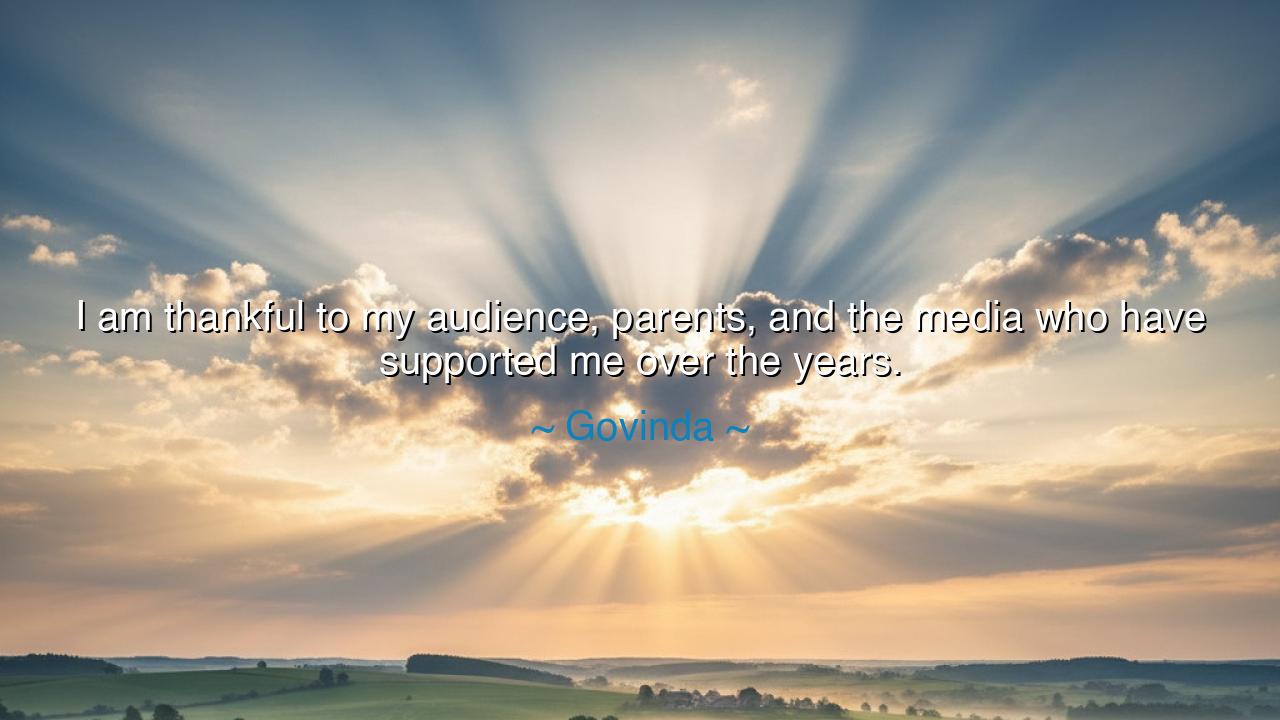
I am thankful to my audience, parents, and the media who have
I am thankful to my audience, parents, and the media who have supported me over the years.






Hear, O seeker of wisdom, the words of Govinda, who declared with reverence and humility: “I am thankful to my audience, parents, and the media who have supported me over the years.” This saying is no passing courtesy, but the distilled essence of a lifetime in the public eye. For in these words, he reveals the eternal truth that no man rises to greatness alone; every star is lifted by unseen hands, every journey is sustained by those who believe and support along the way.
The origin of this utterance lies in Govinda’s long and storied career, a path filled with triumphs, challenges, and reinventions. He rose from humble beginnings to become a beloved figure in Indian cinema, known for his charisma, energy, and laughter that brought joy to millions. Yet in remembering his success, he does not claim it as his own. Instead, he bows before the audience, whose love gave meaning to his performances; his parents, who nurtured him with sacrifice; and the media, who amplified his voice to the world. Gratitude, not pride, is his foundation.
Such humility has always been the mark of the truly great. Recall the story of Alexander the Great, who after conquering vast lands, once spoke of his indebtedness to his teacher Aristotle, saying, “To my father I owe life, but to my teacher, I owe the art of living well.” Even the mightiest conqueror knew that his victories were not forged by his hand alone. In the same way, Govinda recognizes that his fame was built not only by his own talent, but by the collective support of family, audience, and society.
Notice how he honors the audience first. For in the world of art, the performer may act, sing, or dance with brilliance, but without hearts to receive it, the effort would fade into silence. By giving thanks to those who loved and listened, he acknowledges the sacred partnership between artist and audience—a covenant as old as the storytellers who first gathered their villages by firelight.
He then speaks of his parents, whose unseen labor laid the foundation of his life. Parents often toil in shadows, their sacrifices unrecorded in the annals of fame, yet their influence endures in every triumph of the child. By naming them, Govinda reminds us that no achievement is too great to eclipse the debt we owe to those who first gave us life, nurture, and values.
Finally, he gives honor even to the media, so often criticized, yet undeniably powerful in shaping careers and voices. To acknowledge them with gratitude is to understand that even imperfect instruments may become channels of destiny. It is to see beyond the flaws of men and institutions, and to honor the role they have played in sustaining one’s journey.
The lesson here is profound: cultivate a heart of gratitude, for it binds you to your roots and shields you from arrogance. Success without gratitude is fragile, but success tempered by thankfulness becomes enduring. Therefore, O listener, look upon your own life. Give thanks to those who have lifted you—your family, your companions, your teachers, even those whose work you did not notice, yet who opened doors for you. Speak your thanks aloud, for unspoken gratitude is like a flower left unbloomed.
So let the words of Govinda endure: “I am thankful to my audience, parents, and the media who have supported me.” In them lies the eternal teaching that greatness is not a solitary crown, but a shared inheritance. Carry this truth within your heart, and you will walk in humility, strength, and joy, leaving behind not only achievements, but also a legacy of gratitude that will inspire generations to come.






AAdministratorAdministrator
Welcome, honored guests. Please leave a comment, we will respond soon